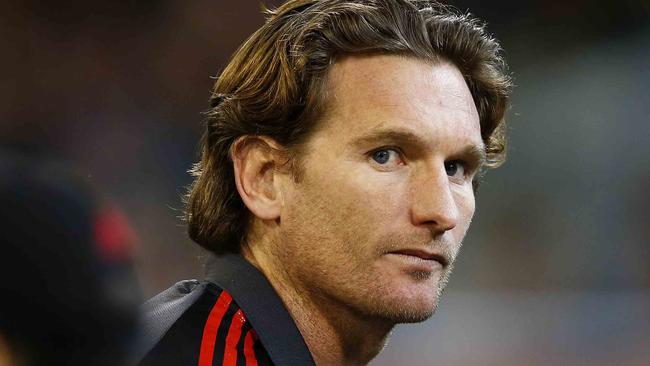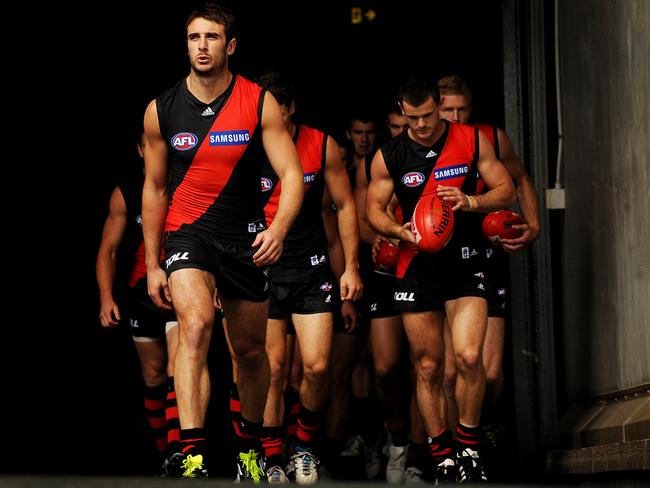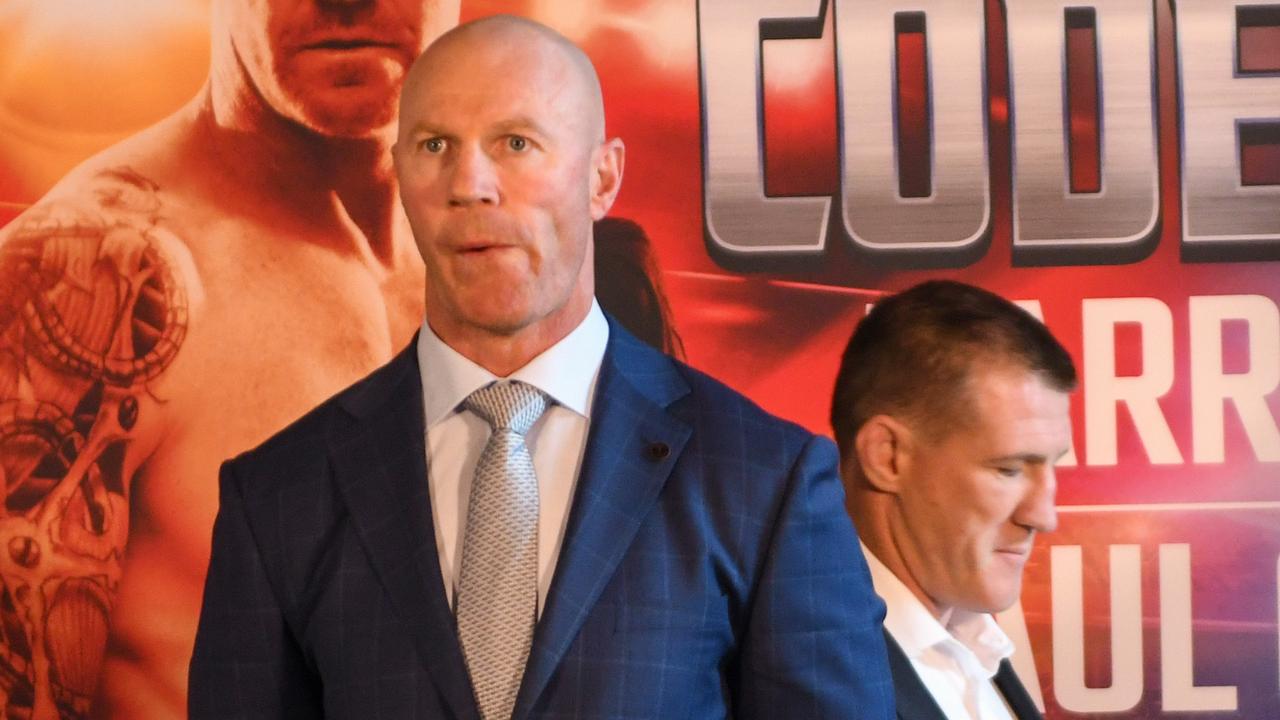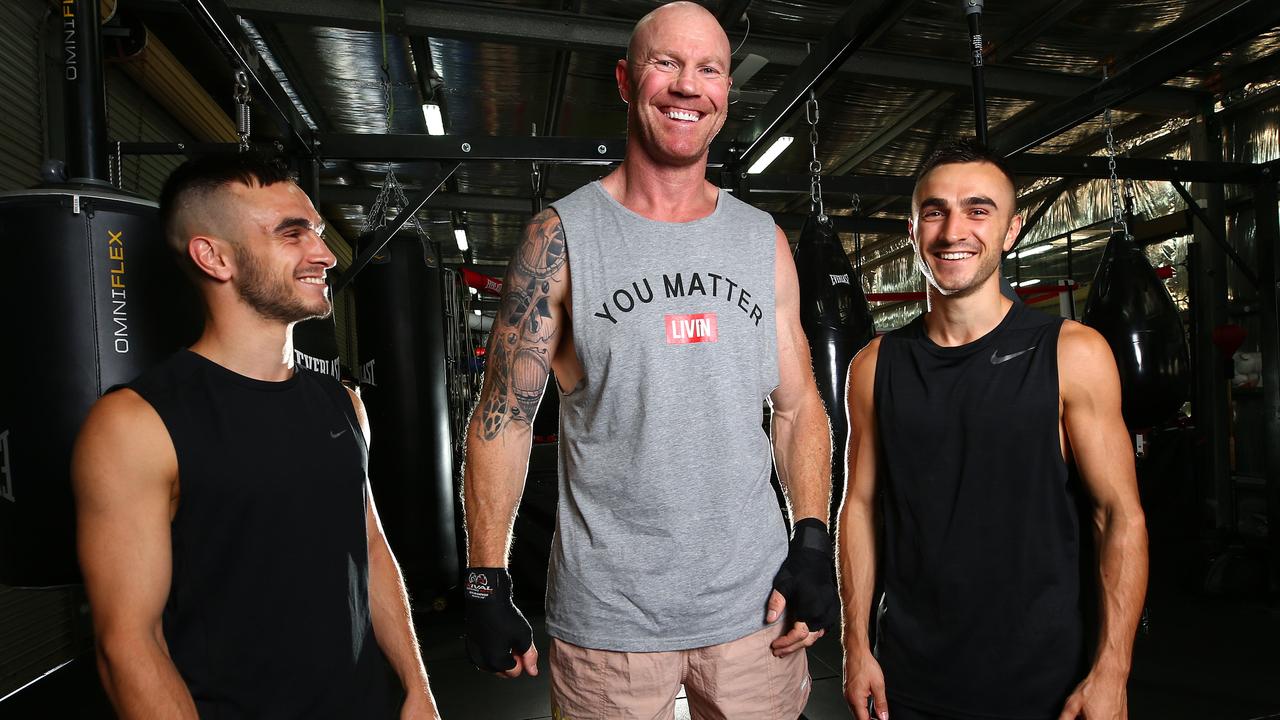Essendon, James Hird have right to feel angry after being found not guilty by anti-doping tribunal
AFTER two years of anxiety and fear, Essendon players are footballers again — not drug cheats. And the saga’s No.1 villain might ask for an apology.

AFL
Don't miss out on the headlines from AFL. Followed categories will be added to My News.
THERE will be some unsettled individuals today and many of them would be current and former AFL officials.
The players would not be among them.
They will sleep soundly tonight. After two years and two months of anxiety, fear and uncertainty, they are footballers again. And not drug cheats.
NOT GUILTY: FOLLOW LATEST ON ESSENDON VERDICT
PLAYERS AND FANS: HOW THE FOOTY WORLD REACTED
ROUND 1: HOW ESSENDON’S TEAM MIGHT LOOK
It was never their fault, of course, but a drug cheat is a drug cheat. Just ask Chris Judd, who last season taunted the Bombers on the field.
James Hird will not be among them, either.
He will sleep soundly — once he contains his anger.
One time during this inglorious and flawed investigation into Essendon’s 2012 supplement program, he was likened to Lindy Chamberlain, an evil individual who just had to be guilty of the crime.
You see, just as prosecutors spun a fanciful story that Chamberlain had killed her baby, the AFL spun a story that Hird was the architect — with Stephen Dank of a drug regime of horrific proportions.
Today, the Bombers were found not guilty.
There’s no more emphatic two words in the English language than not guilty. Actually, there might be. One starts with G and the other with F and Hird might want to scream them from the rafters.
Told way back on the morning of February 5 by the AFL’s current chief executive Gillon McLachlan that his players had been given performance-enhancing drugs, Hird can now tell McLachlan he was wrong.
Hird wanted to say that at a press conference hours later, when sitting beside David Evans and Ian Robson, but he was told not to. McLachlan and then Essendon’s suddenly employed crisis manager and now senior AFL executive, Elizabeth Lukin, strongly advised against it.
Take full responsibility, he was told to say. And he did. And the media lynch mob never let him forget it.
There will be some unsettled and disenchanted media folk today.
They ran a relentless campaign — on the back of unsubstantiated accusations of drug use and a belief the old Windy Hill was nothing but clandestine and dangerous drug den — to have Hird booted out of the the AFL.
When the investigation was at its most frenzied, some of them even won major media awards.
They played judge, jury and executioner on misinformation.
Clearly, it was a sensational story with Hird the No. 1 villain.
At one time, Hird was said to be warned by the AFL about the use of peptides. On the day the story broke, the AFL just happened to make an amendment to the original notes taken two years earlier.
At another time, it was written that Essendon was being investigated for 35 different drugs when, at the end, it was one, Thymosin, which may have referred to Thymosin Beta 4 or Thymomdulin.

All the time there were continuous references to off-site and subcutaneous injections and midnight text messages and AOD-9604 and calf’s blood and pigs guts and Mexican jumping beans and whatever else the propaganda machine was spitting out.
Mistakes were made on all fronts.
Dank and Dean Robinson were experimental. Hird was enthusiastic and perhaps naive, while everyone else at Essendon, including Mark Thompson and Ian Robson and David Evans, have to take a level of responsibility.
So did the AFL. They already have one writ claiming a lack of duty of care and who knows how many will join that list.
Unquestionably, after the AFL learned of the contents of the Project Aperio investigation by the Australian Crime Commission, the AFL set out to get Essendon as a whole and Hird as an individual.
It’s why governance became the buzz word when the AFL wanted the Bombers out of the 2013 finals series.
Unprecedented in an ASADA investigation, the AFL demanded an interim report and demanded that ASADA’s findings paint Essendon’s governance as shambolic.
The Bombers took a $2 million hit, lost draft picks and were booted from the 2013 finals. Hird was ultimately suspended, too, when Australian Sports Commission boss John Whylie was drafted in to help AFL chairman Mike Fitzpatrick and Essendon chairman Paul Little close a deal which included Hird’s ban of 12 months.
Fitzpatrick wouldn’t budge on Hird being penalised and Essendon begged Hird to accept.
Hird’s anger with the AFL is absolute.
One day, he’ll tell his story when Essendon actually allows him to talk about everything that happened, about Dank and Robinson and the supplement program. And the most intriguing, all those heated meetings and conversations with AFL officials.
At different times and directly and indirectly, the AFL’s two highest office holders, Andrew Demetriou and Fitzpatrick, both wanted to Hird to resign or be sacked or at the very least be suspended.
Demetriou hinted at it in a radio interview in April, 2013. And Fitzpatrick told Hird in August, 2013, at the so-called “hearing’’, that he couldn’t believe that Hird had not resigned.
Perhaps an apology is in the offing.
Throughout it all, Hird became the face of the supplement regime even more so than the mysterious Dank.
Resolutely, he has stood his ground in the face of withering media and public backlash, which was so fierce and personal that his young family had to be spared from newspapers, TV news and the radio.
The times his children came home from school in tears both cruelled him and drove him.
He has maintained from day one, in February 2013, that his players did not take performance-enhancing drugs and today the AFL’s anti-doping tribunal agreed.
Some will try to argue “insufficient evidence’’ doesn’t mean it didn’t happen. It is the defence of the desperate.
Originally published as Essendon, James Hird have right to feel angry after being found not guilty by anti-doping tribunal


